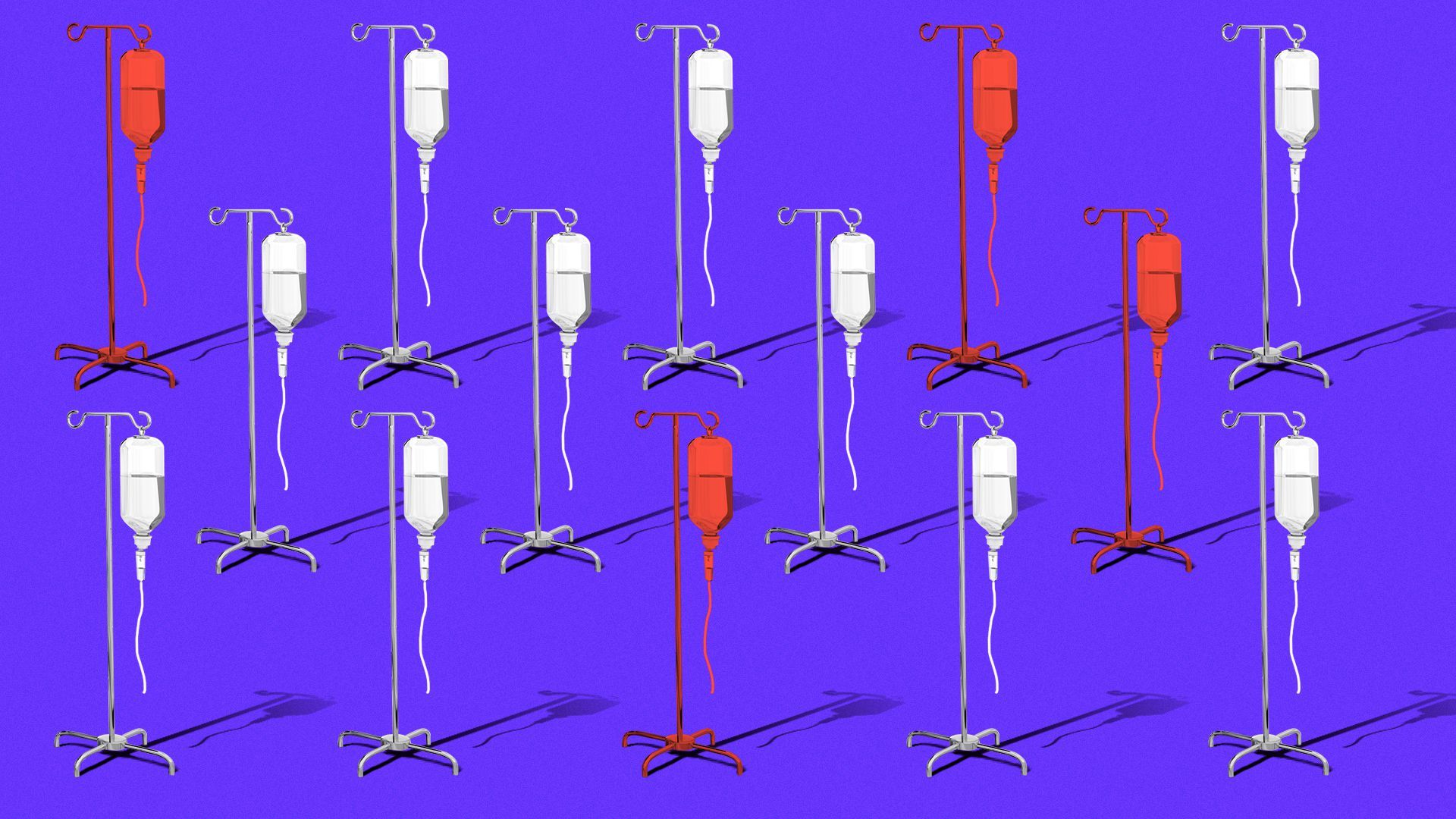Pandemic may drive up cancer cases and exacerbate disparities
Add Axios as your preferred source to
see more of our stories on Google.

Illustration: Aïda Amer/Axios
Doctors are concerned the coronavirus pandemic is going to lead to an uptick in cancer incidence and deaths — and exacerbate racial, ethnic and socioeconomic disparities seen with the disease.
Why it matters: The U.S. has made recent advances in lowering cancer deaths — including narrowing the gap between different race and ethnicities in both incidence and death rates. But the pandemic could render some of these advances moot.
"This pandemic has had, and will continue to have, this compounding effect on cancer and cancer disparities. For example, a lot of the under-resourced safety net hospitals are being significantly stressed by the pandemic. ... And these facilities are actually where many underrepresented minorities and medically underserved patients get their cancer care."— John Carpten, professor and department chair at University of Southern California Keck School of Medicine, tells Axios
Driving the news: The American Association for Cancer Research on Wednesday released its first annual cancer disparities progress report, which dives deep into the complex factors surrounding this issue, and also looks at the similarities between COVID-19 and cancer disparities. They found:
- The burden of COVID-19 falls disproportionately on racial and ethnic minority groups. For example, Hispanics, who are about 18% of the U.S. population, account for 34% of COVID-19 cases.
- Social determinants of health — such as where a person lives, works and obtains food and the ability to get access to health care — and underlying health conditions affect a person's risk. For example, urban Medicare recipients have a three times higher rate of hospitalization for COVID-19 than rural Medicare recipients.
- Researchers are investigating the role that biological or genetic factors may play in the severity of complications in COVID-19 patients. One such question is whether there's a higher risk in African Americans with asthma who have higher levels of two proteins (ACE2 and TMPRSS2) needed for SARS-CoV-2 infection of cells.
- The report also found various barriers to timely COVID-19 testing in underserved communities.
Threat level: National Cancer Institute Director Ned Sharpless told scientists at a July roundtable that just looking at two cancers (breast and colorectal), there will likely be 10,000 additional deaths over the next decade due to the drop in screening and treatments during the pandemic.
- "One thing we're very worried about in particular is the impact of hospital closures and reduced clinical capacity on patients with cancer, the reductions in screenings, the reductions in patient care," Sharpless said.
- Carpten, who also is chair of both the report's steering committee and the AACR Minorities in Cancer Research Council, agrees. "If you had to put off your diagnosis by even six months, that cancer could grow and progress and maybe even metastasize in that timeframe."
Cancer research has also seen an "unprecedented disruption" from the pandemic, NIAID Director Anthony Fauci has said. A significant portion of private and public research into multiple illnesses, including cancer, has been diverted to tackling the novel coronavirus.
- For instance, the Frederick National Laboratory for Cancer Research, using specified funding for the pandemic, geared its main research to SARS-CoV-2 from cancer-causing HPV.
- Among other responsibilities, NCI is involved in evaluating antibody tests and creating the SeroNet collaboration on the coronavirus.
- But, Sharpless also told the roundtable that cancer remains NCI's No. 1 focus.
Meanwhile, Sharpless said the research and medical communities need to take action against racial, ethnic and socioeconomic disparities.
- "As cancer researchers, we each have a role to play in confronting systemic racism and injustice ... [we can] commit to taking action to make things better in terms of cancer disparities and the diversity of our workforce," Sharpless said.
Go deeper:
